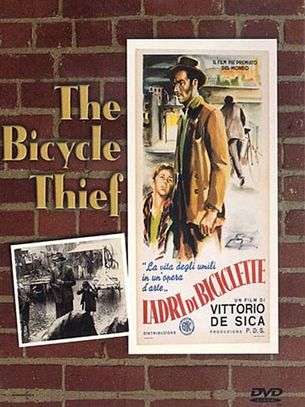Bicycle Thieves

"No bicycle, no job."—Antonio's employer
Ladri di biciclette (translating in English as Bicycles Thieves, though it is more commonly known in that language as The Bicycle Thief) is a 1948 Italian drama film directed by Vittorio De Sica. The film is regarded as one of the greatest films ever to come out of Italy, and one of the greatest overall of all time; regularly appearing on various critics' and magazines' lists of the top 10 best ever made and winning the 1950 Academy Honorary Award for Best Foreign Language Film. It is also arguably the Most Triumphant Example of the neorealist movement in Italian Cinema, as well as one of the saddest films of all time.
In the stagnating slums of post-World War II Rome, Antonio Ricci (Lamberto Maggiorani) is down-and-out man desperate for a job to support his wife and two children. He finally lands a job putting up posters; but it bears with it the condition that he must own a bicycle. Without one; he's fired. In order to redeem his bike from the pawnbroker, Antonio's wife is forced to pawn their bedsheets (which were a wedding present). But it is worth the loss, for he gets the bike back and it thereby seems they have been delivered from poverty. However; later that day, while Antonio is at work putting up some posters, a young man hops on the bike and rides off with it. Antonio gives chase for a moment but loses the thief. Frantically, he goes to the police, but not realizing the ramifications that having a bike has for Antonio and his family, they refuse to take the theft seriously. When Antonio returns to the scene, all the witnesses to the theft have departed. Thus he and his son Bruno (Enzo Staiola) are forced to haplessly wander the streets of Rome searching for the bike themselves...
The plot of Pee-wee's Big Adventure was loosely inspired by that of this film.
- Amateur Cast: The three main actors never appeared on film before.
- Can't Get Away with Nuthin': Frustratingly so.
- Cool Shades: The apparent leader of the thief's neighbors has them.
- Despair Event Horizon: See He Who Fights Monsters.
- Downer Ending
- The Everyman: Antonio Ricci.
- Extremely Short Timespan
- Good Bad Translation: The film is far more commonly known as The Bicycle Thief than by its true English translation of Bicycle Thieves.
- Heroic BSOD: Antonio has one when he is caught by the crowd after stealing a bicycle.
- He Who Fights Monsters: After chasing the thief for a day without getting his bicycle back, Antonio eventually steals a bicycle himself.
- Karma Houdini: The thief gets no comeuppance for his actions.
- Playing Sick: When Antonio catches up with the thief, he (the thief) pretends to faint.
- Selective Enforcement: Antonio finds the thief, but the police doesn't arrest him, because there is no proof. When Antonio tries to steal a bicycle himself, he is caught immediately.
- Sliding Scale of Idealism Versus Cynicism: Decidedly cynical.
- Tear Jerker
- The Woobie: Antonio. Just Antonio...